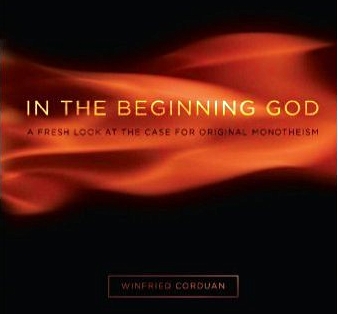Podcast: Play in new window | Download
Subscribe: Spotify | Email | RSS
 Once upon a time, were there no monotheists? Did monotheism evolve rather recently, as humankind somehow outgrew polytheism or animism? These views are often assumed nowadays, although in previous times, it was assumed that the earliest human religions were monotheistic. Some have non-rational reasons to prefer one or the other, but what does the available evidence say?
Once upon a time, were there no monotheists? Did monotheism evolve rather recently, as humankind somehow outgrew polytheism or animism? These views are often assumed nowadays, although in previous times, it was assumed that the earliest human religions were monotheistic. Some have non-rational reasons to prefer one or the other, but what does the available evidence say?
In this recent book, Dr. Winfried Corduan re-opens the case for “original monotheism,” the view that the forms of human religion which are probably the oldest, are mostly monotheistic, which is what one would expect if the earliest human religions were all or mostly monotheistic. He explains the life work of the amazingly hard-working anthropologist Wilhelm Schmidt (1868-1954).
You can also listen to this episode on Stitcher or iTunes (please subscribe, rate, and review us in either or both – directions here). It is also available on YouTube (scroll down – you can subscribe here). If you would like to upload audio feedback for possible inclusion in a future episode of this podcast, put the audio file here.
Links for this episode:
- Win Corduan’s blog
- Win Corduan’s website
- podcast 95 – Dr. Winfried Corduan: Are all religions the same?
- Dr. Corduan’s books
- Wilhelm Schmidt
 the Cambridge Platonists
the Cambridge Platonists- David Hume: Dialogues and Natural History of Religion (this latter work is an early theory of religions, on which polytheism precedes monotheism, based solely on Hume’s reading of classical literature)
- traditional religion among the Kikuyu people of Kenya
- leading sociologist of religion Dr. Rodney Stark
- anthropologist E. E. Evans-Pritchard
- Robert Ellwood, The Politics of Myth: A Study of C.G. Jung, Mircea Eliade, and Joseph Campbell
- Donald Lopez, The Story of Buddhism: A Concise Guide to Its History & Teachings
- This week’s thinking music is “Quasi Motion” by Kevin MacLeod.

Thanks for the clarification on the value judgement on cultures and the use of the word “better” I almost got a little worked up there 😛
It’s a touchy subject to be sure. In the book there is no hint of his looking down or certain peoples as lesser. I think he takes a very broad view, and treats all people as equally made in God’s image.
Monotheism is a really weird term, Dr. Corduan talked about Henotheism, but the difference between Monotheism and Henotheism entirely depends on what the definition of a God is. So, for example was Philo of Alexandia a Monotheist or a Henotheist, it’s not quite clear, he believed in he one God, but also in the logos which could be described as a God. Is a monotheistic religion just one which declares there is only one that may be called a God? If that’s the case then both Judaism and Christianity (I’m not sure about Islam) are in trouble since in the bible others are called god, perhaps Ina different sense than the usage of God for the One God, but still a god.
Is monotheism just that there is only one ultimate God with lesser gods that are gods in a different way, in that case I’m not sure what the distinction from Henotheism is. Even Trinitarian systems have this problem, you have one God head, but that is made up of 3 persons who individually can be called God but who are not themselves the Godhead, is that monotheism or a form of Henotheism? I don’t know really. One of the most annoying arguments against the Jehovah’s Witness theology is that it’s Henotheistic rather than monotheistic, since when you actually examine those terms and the claims to monotheist and Henotheism, they end up being meaningless.
“the difference between Monotheism and Henotheism entirely depends on what the definition of a God is” I would be willing to argue that we should ban the term “Henotheism.” It was introduced by Max Muller, but has never really earned its keep, never had any one clear, widely used definition. Unlike Dr. Corduan, I don’t define monotheism as requiring monolatry. I define it, roughly, as there being a necessarily unique deity. This, I think correctly, leave it an open question how many lesser deities there may be.
Yes, I think there are some serious problems surrounding the term “monotheism.” I try to sort them out in a paper of mine which is currently out for review at a journal… Will post on that, I hope, by the end of the year?
The whole question on what the word “God” actually means is larger than many people think. The bible obviously uses it in more than one way, and it’s been used in all sorts of ways throughout history. It’s one reason I pull my hair out when I hear atheists say something profoundly silly about theists like “we used to believe in Zeus and Odin and all sorts of other Gods, now you’re an atheist when it comes to those Gods, I just believe in one less God,” as if the way the word God is used in relation to the pagan pantheons is anyway related to the way the Abrahamic faiths use the term God. Anyway, I agree the term “Henotheism” is kind of a useless term.
Roman,
One amusing thing about Atheists is that most of them don’t realize that, in all ancient cultures, the “gods” were the sun and the planets (of astronomy) that we still observe today. Thus, all Atheists really do believe in them (albeit, they may not concur with the mythical stories that the ancients used to personify what they observed in the skies).
I find a whole lot of these New Atheist inspired secularists to be, frankly, stupid. I get the feeling that they want to criticize theology but don’t know anything about it, and they don’t know anything about it becuase they don’t respect it enough to want to know anything about it, nor do they care to know anything about history.
I recently talked to an atheist who said that had christianity not started modern science would have advanced so much quicker that we probably would have had the internet 500 or 600 years ago, a statement so profoundly stupid it shocked me. He obviously has no idea what Aristotilian science was, or what kind of science the pagans were persuing, or even infact what the so-called “dark ages” were compared to previous times. It’s unfortunate that these guys can be so arrogant and say such stupid things and are hardly ever challenged.
Roman,
Yes, that is a foolish statement for an Atheist to make. Many of them also don’t realize that true “science” is a matter of observation. Thus, many of the “theories” or origins proposed by scientists that Atheists take to be “scientific” are really not all.
An Atheist or a scientist has no more “scientific” evidence of how the universe came to be than a Christian does. Nobody was there to see it happen (and nobody has discovered a beginning or any boundaries of what we know to exist).
Likewise, even “history” is subject to what is actually recorded as “history.” Not everything that may or may not have happened in the past is actually “history.”
This was a fantastic episode for me because Anthropology (physical; biological) is my particular field of “expertise,” but I’ve always been interested in how my field (in general) can tie in with my faith. The monogenesis theory (as opposed to the polygenesis theory) for human origins lines up more with the paleontological and genetic data, and also with the biblical story! Of course, the story in the Bible has a different, more spiritual and metaphorical “take” on the account of the creation of human beings (“‘Adam”), in contrast to a more secular interpretation of human origins. However, I think there are “clues” in the Hebrew text of Genesis 2 that can be saying somethings that could be very significant to a modern reader.
First, the order of creation in Genesis 2 is turned on its head when compared to Genesis 1, so we must determine the intent of the text, and not quickly assume there is a contradiction. Second, we have to look at the Hebrew text to see if there is anything significant.
(For example, why in the Hebrew is there an extra yud [?] in the word “yi?er” [“he forms”] when God forms ‘Adam out of the ‘adamah [“ground”] in Genesis 2:7, as opposed to the use of one yud [?] in “yi?er” when God forms the animals out of the ‘adamah in verse 19? In his book, “The Science of God: The Convergence of Scientific and Biblical Wisdom,” [New York: Free Press, 2009] on page 145, Dr. Gerald L Schroeder writes, “…by doubling the yud for mankind, the Bible is telling us that although mankind and animals may share a common physical origin, there is an extra spiritual input in humanity. The neshama, the spiritual soul of humanity, is the factor distinguishing man from beast.” Indeed, if there is an origin common to all life, this is evidence of common ancestry even in the Bible, but what makes humans unique is our soul/spirit.)
Third, we have to ask, if ‘Adam wasn’t created in Eden (according to Genesis 2:8, Eden was planted “eastward” [Hebrew: mi-qedem] in Mesopotamia), where was he created? Is Africa a possible candidate? Is there a major time gap between the time of ‘Adam’s (humanity’s) creation (Genesis 1:27 and 2:7) and the time in which God placed ‘Adam (a single man) in Eden (Genesis 2:8)? I know that these are speculative questions, but they are some to think about.
As to Schmidt’s and Dr. Corduan’s theories on original monotheism, I certainly think they make good cases for the primordial religion being monotheistic. I am currently rethinking what I was taught in my anthropology classes in college, that Edward Burnett (“E.B.”) Tylor’s model of religious evolution is the “best” explanation for the development of religions.
However, I wouldn’t say that Adam and Eve (given that they had a literal existence) were partakers of a monotheistic “RELIGION.” No, what Adam and Eve had was a monotheistic RELATIONSHIP, a communion (so to speak) with the only true God. I believe that religion developed as a result of the Fall, as a way to “mediate” between the Divine and human beings. In other words, a religion, with all of its rules, regulations, and so forth, is only a temporary vehicle in the anticipation of something FAR better.
I have a lot more to say on this subject, but I feel like I am just rambling now. So, thank you Dr. Tuggy for another great podcast!
Kalvin,
I’m not sure that Dr. Shroeder’s speculation about NShMT is plausible because the Hebrew word is used of the “beasts” as well (Genesis 7:22). Thus, I don’t think the ancient Hebrews would have associated any difference between humans and animals on the basis of “the breath.” Rather, it seems that the physical form was the primary distinguishing feature (Genesis 2:18-24).
With regard to whether or not Adam and Eve weren’t individual (real, historical) persons, it would seem that the biblical genealogies resolve the matter (at least as far as the biblical testimony is concerned). There’s no indication that “symbolic” people would be consistent with the Hebrew birth records.
I’m also wondering what you think is the radical difference in the order of creation in Genesis 1 and Genesis 2.
The notion that humans share a common ancestor with the beasts and are only superior because, at some point in human evolution, God stuck souls in a couple of them is really quite bizarre. According to evolutionary theory, change takes place very gradually over long periods of time. Another part of the theory is that there wasn’t a first human pair, but rather there was a human population of about 30 thousand individuals. And this population of 30 thousand individuals would have been virtually indistinguishable from what came before, since evolution is so slow.
Thus, according to the view that tries to harmonize Christianity with modern evolutionary theory, there must have been individuals who got souls stuck in them while their parents did not, meaning that the first humans were raised by animals. Who knew that Adam was really Tarzan! And since his parents were animals and not humans, if there was a famine he could always butcher and eat mom and pop to survive;-)
Comments are closed.